Shiitake Benefits (Lentinula edodes)
Shiitake (Lentinula edodes) is an edible mushroom and medicinal mushroom.

Supports Gut Health
Shiitake mushroom may play a beneficial role in gut health, as indicated by recent research exploring its effects on the microbiome. For instance, a study focusing on alternative medicine therapies for colitis showed that treatments involving components such as Saccharomyces boulardii and Codonopsis pilosula polysaccharide - which can be similarly derived from Shiitake - led to improvements in gut health. The therapies helped ameliorate clinical symptoms and altered the gut microbiome favorably, increasing the presence of beneficial, short-chain fatty acid-producing bacteria, thereby suggesting potential prebiotic effects Read the study.
Additionally, Rice Bran Arabinoxylan Compound (RBAC), modified by Shiitake mushroom enzymes, also shows extensive health-promoting properties. Research indicates RBAC’s ability to exert immunomodulatory, anti-inflammatory, and antioxidant effects. While its main applications have been observed in adjunct cancer therapy, its benefits extend to other areas of health, including improved management of conditions such as irritable bowel syndrome (IBS) and other gastrointestinal issues. This highlights the potential role of Shiitake-derived substances in supporting a healthy gut Discover more here.
These findings suggest that Shiitake might contribute to a healthier gut environment, not only by ameliorating symptoms of intestinal distress but also by fostering a balanced bacterial ecosystem.
Learn about mushrooms with gut health benefits.

Neuroprotection Benefits
Shiitake mushrooms are not only known for their culinary appeal but also for their health-promoting properties. Among the various benefits, Shiitake has shown potential in neuroprotection due to its bioactive compounds. Research involving Rice Bran Arabinoxylan Compound (RBAC), which is derived from rice bran and modified with enzymes from the Shiitake mushroom, suggests multiple health benefits that extend to the nervous system.
RBAC has been recognized for its immunomodulatory, anti-inflammatory, and antioxidant properties, which are vital in the context of neuroprotection. Inflammation and oxidative stress are key contributors to neurological disorders, and combating these factors is crucial for maintaining cognitive function and preventing neurodegenerative diseases.
While the direct neuroprotective effects of RBAC continue to be explored, the existing research underpins the potential of Shiitake mushroom in supporting brain health through various mechanisms. This extends the role of Shiitake beyond the traditional applications, promising avenues in the supportive management of neurodegenerative conditions and overall neuronal maintenance.
Learn about mushrooms with neuroprotection benefits.

Anti-inflammatory Benefits
Shiitake mushrooms are not only a savory addition to meals but also a rich source of bioactive compounds that contribute to their potent anti-inflammatory properties. A study comparing antioxidant and anti-inflammatory activities of Shiitake mushrooms grown under different conditions revealed significant inhibition of nitric oxide production. This suggests a strong anti-inflammatory potential that could help combat diseases where inflammation plays a key role.
Furthermore, the immunomodulatory properties of Shiitake, highlighted by its polysaccharides' impact on immune responses, are promising for disease prevention and treatment. According to one review article, the immunomodulatory properties of polysaccharides from Shiitake mushrooms have been shown to decrease proinflammatory cytokines, providing a potential therapeutic avenue for inflammatory conditions.
The safety and efficacy of supplements derived from Shiitake mushrooms are of growing interest for their health benefits. Ensuring strict quality control for these products is essential, as indicated by a paper that scrutinized the diversity and quality of mushroom-based dietary supplements in Italy. This research emphasizes the importance of standardized extracts to safely take advantage of Shiitake's anti-inflammatory capabilities.
In partnership with complementary and alternative medicines, Shiitake's influence on the gut microbiome might also play a role in alleviating inflammatory conditions such as colitis, as suggested by a study on the modulation of the gut microbiome for treating colitis in mice.
Additionally, the anti-inflammatory potential of Shiitake extends to clinical applications beyond the gut. A notable example is the bioprocessed edible algae with Shiitake mycelia, showing promise as an anti-inflammatory and anti-allergic agent against allergic asthma. Such findings reinforce Shiitake's role as a beneficial food that can translate into a therapeutic resource against a spectrum of inflammatory conditions.
Learn about mushrooms with anti-inflammatory benefits.

Antioxidant Benefits of Shiitake
One of the significant health advantages offered by Shiitake mushrooms comes from their potent antioxidant properties. Regularly incorporating Shiitake into one's diet could lead to enhanced protection against oxidative stress, a condition associated with chronic diseases and aging. Research indicates that polysaccharides extracted from Shiitake can have a significant antioxidant effect, showcasing their protective capabilities on cellular health.
The bioactive compounds within Shiitake, including polysaccharides, triterpenoids, and phenolic compounds, are responsible for these effects. Studies have found these compounds to combat oxidative damage and support the body's defence systems against harmful agents. Additional evidence from the biochemical analysis of edible mushrooms reaffirms their role in delivering antioxidants to the diet.
Moreover, the antioxidant potential of Shiitake may extend to anti-inflammatory benefits which further bolster overall health and well-being. A study published in the literature compared the antioxidant and anti-inflammatory activities of Shiitake cultivated under various conditions, suggesting that extracting methods and growing environment might influence their health-promoting properties.
The integration of Shiitake mushroom extract into dietary plans is not only safe but has also shown potential in improving the quality of life in aging populations. An extensive literature review on Modified Rice Bran Arabinoxylan, enriched with Shiitake enzymes, highlights its benign nature and scope as a functional food contributing to immune health and antioxidant support.
To fully appreciate the scope of Shiitake's antioxidant capabilities, as well as its broader spectrum of health benefits, it is crucial to continue investigating these remarkable fungi. For interested readers, detailed discussions can be found in the review papers examining the medicinal applications of Shiitake as part of functional foods and its immunomodulatory properties, revealing its impressive role in health and nutrition. The convergence of dietary practices with the biological assets of Shiitake could pave the way for not only scrumptious meals but also a future of enhanced well-being and vitality.
Learn about mushrooms with antioxidant benefits.

Antimicrobial Benefits of Shiitake
Shiitake mushrooms have been recognized for their potent antimicrobial properties, which contribute to their role in promoting health and preventing disease. A number of studies have evaluated the specific ways in which Shiitake can combat various bacterial infections and inhibit the growth of harmful microorganisms.
One noteworthy study focused on the antigingivitis activity of Shiitake mushroom extract, presenting it as a viable natural treatment option. Compared to the standard treatment of chlorhexidine, Shiitake extract demonstrated a preferential inhibition of pathogenic bacteria implicated in gum disease, without significantly affecting beneficial oral bacteria. This selective antibacterial activity makes Shiitake a promising candidate for oral health improvement.
Shiitake's ability to safeguard crops from fungal contamination was also highlighted in research analyzing its efficacy in reducing mycotoxin production by hazardous fungi in food. Specifically, the methanolic extracts of Shiitake were shown to substantially lower levels of fumonisins and fusaric acid — toxins that pose significant health risks to both animals and humans. These findings illustrate Shiitake's potential as a biocontrol agent in agriculture.
Additionally, the potent antibacterial effects against the pathogenic bacterium Pseudomonas aeruginosa have been corroborated through comprehensive studies. A standardized extract of Shiitake mycelium was evidenced to disrupt key infectivity mechanisms of the bacteria, indicating its utility in anti-infective treatments and its promising role as a complement to traditional antibiotics.
This body of research, including the in-depth analysis of mushroom-based supplements in Italy and the overarching review of edible mushroom effects on health, underlines the diverse antimicrobial actions of Shiitake. Emphasizing the importance of quality control and further investigation, these studies provide a strong foundation for incorporating Shiitake into various health and wellness interventions, ranging from dietary supplementation to the development of new antimicrobial agents.
Learn about mushrooms with antimicrobial benefits.

Antiviral Benefits of Shiitake
Shiitake mushroom is not only a culinary delight but also a potent antiviral agent. Studies have shown that it exhibits substantial antiviral activities against SARS-CoV-2, the virus responsible for the COVID-19 pandemic. In laboratory settings, specific compounds found in Shiitake, including catechin and quercetin, have been identified to interact with key proteins of the virus, hindering its ability to replicate.
Beyond its direct antiviral effects, Shiitake's influence on the immune system is formidable. A particular extract from this mushroom, AHCC®, has been extensively studied for its capability to modulate immune cells such as natural killer (NK) and T cells. These cells are crucial for the body's defense against infections and various diseases, including viral ones.
Not only does Shiitake support general immune defenses, but it also shows promise in clinically relevant situations. For instance, AHCC® supplementation was proven effective in a clinical trial aimed at clearing high-risk Human Papillomavirus (HPV) infections, underlining its supportive role in immune function for disease elimination.
Additionally, Shiitake's natural compounds have been modified to enhance their health-promoting properties, such as the Rice Bran Arabinoxylan Compound (RBAC). This compound has been researched for its immunomodulatory and anti-inflammatory properties, and is used in adjunct cancer therapy, as well as in managing other illnesses ranging from HIV to the common cold.
These studies reflect Shiitake’s potential in both enhancing the body's antiviral defenses and managing viral infections, offering a natural and promising support to conventional therapies.
Learn about mushrooms with antiviral benefits.

Supports Digestive Health as a Prebiotic
Shiitake mushrooms are gaining recognition for their role in supporting digestive health, particularly due to their prebiotic properties. Prebiotics are non-digestible food components that promote the growth of beneficial microorganisms in the intestines, and Shiitake mushrooms contain natural polysaccharides that act as food for these good bacteria.
Research into complementary and alternative medicine therapies has provided insights into the prebiotic benefits of polysaccharides found in Shiitake. A notable study titled "Sijunzi Tang, Codonopsis Pilosula Polysaccharide and Saccharomyces Boulardii Modulate the Gut Microbiome to Alleviate Dss-Induced Colitis in Mice" has explored this in depth. Although the study primarily focused on Codonopsis pilosula polysaccharide, the findings highlight the broader potential of polysaccharides in modulating the gut microbiome. These natural compounds were observed to improve clinical symptoms of colitis and promote a healthful balance in the gut microbiome by increasing populations of short-chain fatty acid (SCFA)-producing bacteria—a key marker of a healthy gut—and decreasing harmful bacteria.
This research supports the idea that consuming Shiitake could encourage the proliferation of beneficial gut flora, making these mushrooms a valuable dietary addition for those looking to improve their gastrointestinal health through natural, prebiotic-rich foods.
Learn about mushrooms with prebiotic benefits.

Nutritional Benefits of Shiitake
Shiitake mushrooms are not only a delectable addition to various culinary dishes but also a powerhouse of nutrition. Renowned for their high protein content, these mushrooms offer essential amino acids necessary for body function. Protein plays a critical role in building and repairing tissues, making Shiitake a valuable food source for maintaining muscle mass and overall body health.
Apart from protein, Shiitake mushrooms are a rich source of vitamin B. These vitamins, including B12 often found in animal products, are crucial for energy metabolism and maintaining healthy brain function. The presence of these nutrients makes Shiitake an excellent food choice for vegetarians and vegans. Moreover, the mushrooms contain low levels of fat and cholesterol, which is beneficial for heart health and managing weight.
The significance of Shiitake goes beyond nutrition; it encompasses broader environmental impacts. As highlighted in research examining themes for mushroom exploitation in the 21st century, the cultivation of Shiitake contributes to food security through the bioconversion of agricultural wastes into valuable edible biomass. This not only provides nutritional benefits but also advances environmental sustainability and effective waste management.
The cultivation of Shiitake and other mushrooms plays an integral role in a sustainable future. It addresses the urgent need for conserving biodiversity and harnessing bioremediation. Embracing such practices helps in the preservation of our ecosystem while providing us with nutritious food sources. Shiitake mushrooms, thus, have a profound place in both our diets and the global effort towards environmental conservation.
Learn about mushrooms with nutrition benefits.

Nutritional Benefits: A Source of Vitamin D
Shiitake mushrooms are not just a culinary delight; they are a significant source of essential nutrients, notably vitamin D. A study focusing on the fortification of bread with sunlight-exposed shiitake mushrooms revealed a substantial increase in vitamin D2 levels. By exposing shiitake mushrooms to sunlight for varying periods, researchers successfully enhanced the vitamin D2 content, making it a practical solution to vitamin D deficiency—a prevalent public health issue.
Consuming shiitake mushrooms, especially those exposed to sunlight, can lead to an improvement in vitamin D levels in the body. This is particularly beneficial considering that vitamin D plays a vital role in bone health, immune function, and overall wellbeing. In the cited study, bread fortified with vitamin D2 from sunlight-exposed shiitake mushrooms demonstrated that such fortification techniques could prove to be an effective strategy for increasing dietary vitamin D2 intake.
Learn about mushrooms with nutritional benefits.

Nutritional Advantages and Sustainability
Shiitake mushrooms are not only valued for their distinctive taste but also for their robust nutritional profile. Rich in protein and essential vitamins, particularly B vitamins, they offer substantial health benefits. Shiitake's low fat and cholesterol levels make them an excellent dietary choice for those looking to maintain a healthy lifestyle. Further insights into their nutritional value have been explored in recent studies.
Moreover, the cultivation of Shiitake represents an efficient way to tackle food security issues by transforming agricultural waste into valuable edible biomass. This biotransformation process not only provides a stable food supply but also contributes greatly to environmental sustainability and waste management. An important research paper highlights the significance of environmentally friendly cultivation practices for mushrooms like Shiitake, considering the balance between food production and conservation of biodiversity.
The implementation of Shiitake farming can significantly impact the environment in a positive way. The used mushroom compost can act as a rich fertilizer, promoting soil health, and also serves as a bioremediating agent. Conservation practices in Shiitake cultivation are not only beneficial for human health but also pivotal for the conservation of natural resources and maintaining the delicate balance of our ecosystem. Research underscores the ecological benefits of these remarkable fungi and their role in a sustainable future.
Learn about mushrooms with health-promoting benefits.
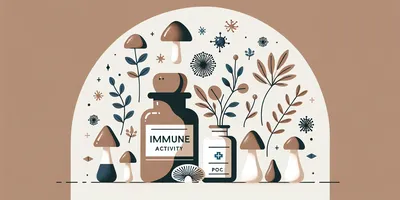
Enhancement of Immune Activity
Shiitake mushrooms have shown significant potential in boosting immune system health. Notably, the Rice Bran Arabinoxylan Compound (RBAC), derived from rice bran modified with Shiitake enzymes, has been thoroughly researched for its immunomodulating capabilities, especially significant in aging populations with compromised immune systems. RBAC's health benefits include its antioxidant effects, the enhancement of the phagocytic activity of macrophages and neutrophils, and a boost in natural killer cell activity. This compound can activate adaptive immunity by maturing dendritic cells to heightened T and B cell responses, while also playing a role in regulating mast cell responses to mitigate allergic reactions.
A separate standardized extract, AHCC®, also derived from Shiitake mycelia, has been shown to modulate the activity of immune system cells, particularly NK and T cells. Studies in humans and animals have demonstrated the role of AHCC® in fortifying the host defense against infections and malignancies by modulating these essential immune cells. AHCC® also contributes to the initiation and proliferation of immune cells which are vital in the body's defense mechanisms against diseases. Such findings advocate for further exploration of AHCC® in broader immunological effects, its influence on health and disease, and possible interactions with the intestinal microbiota.
In the realm of fungal omics, breakthroughs are constantly being made to understand the biology and beneficial properties of fungi, including Shiitake. Bioinformatic approaches have showcased research on various aspects of fungal biology that contribute to Shiitake's medicinal properties. Advances in Next-Generation Sequencing (NGS) and bioinformatics are pivotal in uncovering complex interactions within Shiitake and its derived compounds, further emphasizing its role in immune response.
Focusing back on RBAC, its diverse health-promoting properties lend to its application as an adjunct therapy in the clinical setting. Not only has it been studied for its role in cancer treatment support, but RBAC is also being considered for applications beyond cancer therapy such as managing infections and inflammatory conditions due to its immunomodulatory, anti-inflammatory, and antioxidant qualities. This highlights the wide-reaching potential of Shiitake mushroom derivatives in contributing to overall immune health.
Learn about mushrooms with immune activity benefits.

Anticancer Benefits of Shiitake
Shiitake mushrooms are not only a delicious culinary ingredient but also possess significant anticancer properties. A wealth of research has been conducted to discover the therapeutic effects of these mushrooms, particularly in oncology. The Anticancer Activities of Mushrooms: A Neglected Source for Drug Discovery paper highlights that while Shiitake and other mushrooms have shown positive effects on immune modulation and improving the quality of life for cancer patients, further scientific validation is necessary. In particular, polysaccharides found in Shiitake, such as lentinan, have displayed potent antitumor activities.
The role of Shiitake in strengthening the body's defenses against cancer is further supported by the Immunomodulatory Properties of Polysaccharides from Lentinula edodes review, which details how β-glucans and other polysaccharides from these mushrooms can activate immune responses crucial for disease prevention and treatment.
Additionally, a novel approach showcased in the study titled The Combination of AHCC and ETAS Decreases Migration of Colorectal Cancer Cells demonstrates that Active Hexose Correlated Compound (AHCC) derived from Shiitake, when combined with Enzyme-treated Asparagus Extract (ETAS), could significantly hinder the growth and migration of cancer cells while promoting cancer cell apoptosis and enhancing the efficacy of chemotherapy drugs, indicating a powerful symbiosis that could be integrated into anticancer strategies.
Beyond the direct anticancer effects, Shiitake's diverse bioactive compounds contribute to a holistic approach to cancer care. As elucidated in Medicinal Mushrooms: Their Bioactive Components, Nutritional Value and Application in Functional Food Production—A Review, the active components in mushrooms, including Shiitake, could help manage obesity, accelerate metabolism, and slow aging thanks to their high antioxidant activity.
While this emerging evidence is promising, it emphasizes the need for more detailed mechanism studies and clinical trials to ascertain optimal dosages, long-term safety, and the full spectrum of Shiitake's nutraceutical effects. With ongoing research and a better understanding of Shiitake's biochemistry and medicinal value, as explored in The Effect of Edible Mushroom on Health and Their Biochemistry, the potential of Shiitake mushrooms in cancer treatment continues to be an important focus of scientific exploration.
Learn about mushrooms with anticancer benefits.
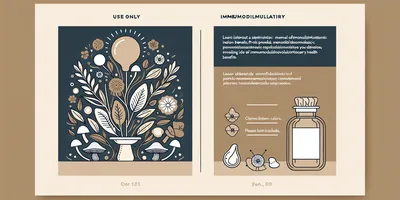
Immunomodulatory Benefits
Shiitake offers significant immunomodulatory effects due to its bioactive components. Polysaccharides, particularly β-glucans, are well-regarded for their influence on the immune system. These natural compounds are adept at altering immune responses, potentially benefitting both disease prevention and treatment. Research has illustrated how shiitake's polysaccharides can activate immune cell receptors, facilitating phagocytosis and cytokine production, and thereby enhancing both innate and adaptive immunity.
In clinical settings, shiitake has been associated with improved immune profiles, especially in cancer patients who may experience compromised immunity due to their condition and treatment. Studies show that dietary consumption of shiitake can translate into notable improvements in lymphocyte count and cytokine profiles, helping mitigate the adverse effects of conventional cancer therapies. The relationship between shiitake consumption and lower cancer risk is also highlighted in a review focused on breast cancer, further underscoring its immunomodulatory potential.
Moreover, the versatility of shiitake as an immunomodulatory agent is supported by its application in various health conditions. For example, the mushroom has been shown to be beneficial in battling infections; a study revealed that a standardized extract from the shiitake mycelium inhibited the growth and infectivity mechanisms of Pseudomonas aeruginosa, making it a potential ally in complementing antibiotic treatments (AHCCR study).
Interestingly, even the application in animal health has indicated promising results. Research involving the supplementation of shiitake mushroom in horses showcased a beneficial effect on immune-related blood parameters (study on horses). This research mirrors the immunomodulatory benefits observed in human studies, thus expanding the relevance of shiitake across different species.
Finally, the immunomodulating effects of shiitake are being explored to enhance the efficacy of other treatments. A study combining Active Hexose Correlated Compound derived from shiitake with Enzyme-treated Asparagus Extract showed a potent synergistic effect in reducing cancer cell growth and invasiveness (AHCC and ETAS study). Additionally, the anti-inflammatory and anti-allergic potential of shiitake was demonstrated in a study showing promising results against allergic asthma using a novel functional food formulation (anti-asthma study).
Given the wealth of scientific determination, shiitake mushrooms indeed hold an esteemed position in both traditional and modern medicine for their ability to modulate and boost immunity, offering a natural approach to maintaining and enhancing overall health.
Learn about mushrooms with immunomodulatory benefits.
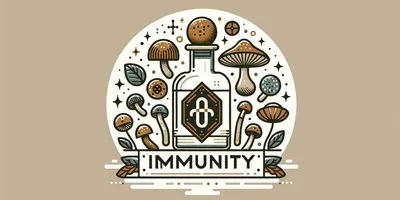
Boosts Immune Function
Shiitake mushrooms hold significant potential in supporting the body's immune system, which is crucial for the defense against various diseases and infections. Research has indicated that bioactive compounds in Shiitake may prevent lymph node metastasis, maintain immune function, and decrease chemotherapy-induced side effects, which can collectively improve patients' quality of life, especially among those suffering from high-mortality cancers like gastric, breast, and colorectal cancers.
In another focused study, Shiitake mushroom derivatives have demonstrated impressive results in supporting the immune system to clear persistent high-risk human papillomavirus (HPV) infections. The use of Shiitake-based AHCC (Active Hexose Correlated Compound) supplementation notably supported immune function and facilitated the clearance of HPV infections, with a significant portion of the participants showing negative HPV DNA/RNA after the intervention. This research strongly supports the inclusion of Shiitake as a dietary component for its potential immune-boosting properties.
These findings reflect the immunomodulatory capabilities of Shiitake mushrooms and their extracts. Regular incorporation of Shiitake into the diet or as a supplement could therefore be a strategic component in enhancing overall immune health and combatting infections such as high-risk HPV. While these studies are promising, they also highlight the need for further large-scale trials to confirm optimal dosages and better understand these clinical outcomes.
Learn about mushrooms with Immunity benefits.
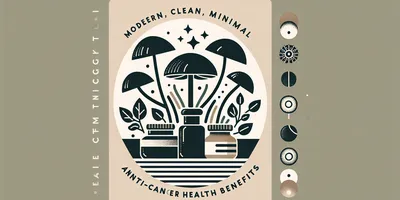
Anti-cancer Benefits
Shiitake mushrooms are not just a savory addition to meals, but also a potential ally in the fight against cancer. These mushrooms have been the focus of scientific research due to their rich composition of bioactive compounds. For example, they contain important trace elements like selenium, which have been linked to cancer prevention. However, caution is advised due to the possibility of bioaccumulation of harmful substances in some wild mushrooms.
One of the most promising areas of research is the impact of Shiitake on breast cancer. Studies suggest that specific compounds in these mushrooms may reduce the risk of breast cancer and support the immune system. This can be particularly beneficial when combined with traditional cancer therapies, potentially mitigating their adverse effects.
The healing potential of Shiitake mushrooms is further supported by their effect on immune cells. A standardized extract of Shiitake mycelia, known as AHCC®, has been shown to enhance the activity of natural killer (NK) and T cells, which are crucial for the body's defense against malignancies. The review of studies on AHCC® proposes more research to understand its therapeutic implications fully.
Furthermore, Shiitake's influence extends to helping the body combat cancer through Rice Bran Arabinoxylan Compound (RBAC). RBAC is modified with Shiitake mushroom enzymes and may improve the quality of life for cancer patients by supporting immune function. Interest in RBAC's health-promoting properties is growing due to its potential role as an adjunct therapy in cancer treatment and various other health conditions, with no known side effects at common doses.
Incorporating Shiitake mushrooms into the diet could therefore be an adjunct strategy for enhancing cancer treatment, boosting the body's immune response, and potentially offering a protective effect against the development of certain types of cancer.
Learn about mushrooms with Anti-cancer benefits.

Hepatoprotective Benefits of Shiitake
Shiitake mushrooms are not only known for their rich umami flavor but also for their remarkable health benefits, particularly in protecting and supporting liver health. One prominent functional food derived from these mushrooms is the Rice Bran Arabinoxylan Compound (RBAC), which boasts a plethora of therapeutic properties.
RBAC is a modified form of rice bran enriched with enzymes from Shiitake mushrooms. It has been extensively studied and shown to wield immunomodulatory and anti-inflammatory effects, which contributes to its hepatoprotective capabilities. Furthermore, its antioxidant attributes play a critical role in combating oxidative stress, one of the common pathways leading to liver damage like nonalcoholic fatty liver disease (NAFLD) and hepatitis.
The clinical applications of RBAC are not limited to supporting liver health. It has also been utilized as an adjunct therapy in cancer treatment, exhibiting potential to enhance immune functions, raise the quality of life, and even extend the survival of cancer patients. Other possible health spheres that could benefit from RBAC include management of HIV infection, diabetes, irritable bowel syndrome (IBS), and chronic fatigue syndrome (CFS), as well as preventing the common cold.
Remarkably, the consumption of RBAC exhibits no known side effects at typical dosages, making it not only an effective but also a safe approach to maintaining liver health.
Learn about mushrooms with hepatoprotective benefits.

Hypocholesterolemic Benefits of Shiitake
Shiitake mushrooms have been recognized for their potential to improve blood lipid profiles and thus support cardiovascular health. A notable characteristic of Shiitake is its hypocholesterolemic effect, which refers to the mushroom's ability to lower cholesterol levels in the blood. Cholesterol management is crucial for preventing various heart-related conditions, including atherosclerosis and coronary artery disease.
This cholesterol-lowering effect is thought to be due to the presence of beta-glucans, a form of soluble dietary fiber found in Shiitake. Beta-glucans are known to help reduce the absorption of cholesterol in the gastrointestinal tract and increase the excretion of bile acids, which are produced from cholesterol. This process can result in the lowering of circulating cholesterol levels.
Research is ongoing to fully understand the mechanisms behind the hypocholesterolemic benefits of Shiitake. For instance, a study entitled "Effect of Lentinula edodes on Morphological and Biochemical Blood Parameters of Horses" observed effects on various blood parameters in horses supplemented with Shiitake mushrooms. Although the primary focus was on immune response, the findings suggested potential metabolic benefits, such as lower blood glucose concentrations, which could indirectly influence cholesterol management (read more). While this study was conducted on horses, it provides a groundwork for further investigation into the hypocholesterolemic effects of Shiitake mushrooms in other species, including humans.
It's worth noting that while Shiitake can contribute to a cholesterol-lowering diet, it should be combined with other healthy lifestyle choices for maximum benefit. This includes a balanced diet rich in fruits, vegetables, whole grains, and lean proteins, as well as regular physical activity.
Learn about mushrooms with hypocholesterolemic benefits.

Anti-diabetic Benefits
The Shiitake mushroom, revered not only for its rich flavor but also for its potential medicinal properties, has been shown to have promising anti-diabetic benefits. One of the key elements in Shiitake responsible for this effect is the antioxidant-rich polysaccharides found within its mycelia. A study focusing on Antioxidant activity of polysaccharides extracted from Lentinus edodes mycelia revealed that these polysaccharides exhibit considerable antioxidant activities.
These polysaccharides not only scavenge harmful radicals but also significantly reduce intracellular reactive oxygen species (ROS) levels and apoptotic cell death in INS-1 rat insulinoma cells, which are representative of pancreatic beta cells. Pancreatic beta cells have a crucial role in diabetes, as they are responsible for insulin production. Protecting these cells from oxidative stress-induced apoptosis is pivotal in the prevention and management of diabetes.
The study's findings highlight the potential for Shiitake's extracted components to act as natural antioxidant supplements, which could be integrated into diabetes treatment strategies to shield the key insulin-producing cells, contributing to better blood sugar regulation and overall diabetes management.
Learn about mushrooms with Anti-diabetes benefits.
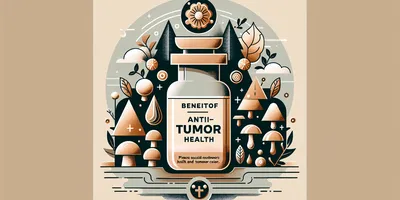
Anti-tumor Benefits
Shiitake mushrooms have been recognized for their potential in cancer therapy, particularly in addressing high-mortality cancers like gastric, breast, and colorectal cancers. Researchers have found that components within shiitake may help prevent lymph node metastasis and improve overall survival rates, while also reducing the side effects of chemotherapy. The immunomodulating properties of shiitake mushrooms are crucial as they maintain immune system functionality and subsequently improve the quality of life for patients undergoing cancer treatment.
The compound within shiitake known to offer anti-tumor benefits is likely related to its effect on the immune system. For instance, a study on horses supplemented with shiitake demonstrated significant changes in white blood cell counts, notably lymphocytes and monocytes, after shiitake supplementation. Lymphocytes and monocytes play an essential role in the body's defense against tumors. While this study was preliminary and conducted on animals, it supports the hypothesis that shiitake can strengthen the body's natural defenses, providing foundational evidence that could lead to advancements in human cancer therapy.
The anti-tumor benefits of shiitake, as summarized in various scientific studies, point toward its utility in adjunctive cancer treatment. However, additional research, including larger randomized controlled trials, is needed to precisely determine effective dosages and understand the scope of clinical outcomes fully.
Learn about mushrooms with Anti-tumor benefits.

Metabolic Health Benefits
Shiitake mushrooms offer significant metabolic health advantages, thanks to bioactive components like Rice Bran Arabinoxylan Compound (RBAC). Research has demonstrated that RBAC, which is derived from rice bran modified with Shiitake mushroom enzymes, contributes to better metabolic health through immunomodulatory, anti-inflammatory, and antioxidant effects.
The consumption of Shiitake mushrooms has been associated with the management of metabolic disorders such as diabetes and nonalcoholic fatty liver disease (NAFLD). The modified rice bran is enriched with RBAC, which shows promise in aiding immune system functions and improving metabolic health, potentially providing a substantial adjunct therapy in the treatment of these conditions.
In addition to their role in directly supporting metabolic functions, the enhanced immune response and anti-inflammatory properties provided by Shiitake mushroom constituents like RBAC may indirectly improve overall metabolic health and quality of life for those with chronic metabolic disorders.
Learn about mushrooms with Metabolic benefit benefits.

Detoxification Benefits of Shiitake
Shiitake mushrooms have garnered attention for their potential role in detoxification, particularly regarding the accumulation of heavy metals such as cadmium (Cd). A study analyzing two genotypes of Shiitake revealed varying abilities to accumulate cadmium — a well-known toxic heavy metal. The research aimed to decode the molecular pathways through which Shiitake mushrooms can absorb and potentially neutralize such toxins.
The transcriptomic analysis conducted on these genotypes, identified as Le4625 and Le4606, brought to light a range of differentially expressed genes that respond uniquely to Cd exposure. This investigation, through intricate RNA-Seq analysis, highlighted essential biological pathways that may influence the mushroom's capacity for Cd accumulation. Among them are transmembrane transport, metal ion binding, and the MAPK signaling pathway, which are all critical in mediating the mushroom's response to heavy metals. Learn more about the study's findings and their implications for Shiitake detoxification properties.
Shiitake's intrinsic detoxifying mechanisms, such as those provided by proteins like major facilitator superfamily transporters, heat shock proteins, cytochrome P450, and glutathione transferases, were earmarked as potentially critical components in enhancing resistance to and accumulation of cadmium. These findings not only illuminate the detoxifying abilities of Shiitake but also pave the way for developing new Shiitake strains with improved health benefits.
Learn about mushrooms with Detoxification benefits.

Strengthens the Body's Defense Against Pathogens
Shiitake mushrooms are celebrated for their ability to boost the immune system's overall functionality. A fascinating study revealed the presence of a protein known as thaumatin-like protein (LeTLP1) within Shiitake. This particular protein was found to play a pivotal role in endowing the mushroom with antifungal properties, specifically against a pathogen called Trichoderma atroviride. Research demonstrated that Shiitake strains with higher levels of LeTLP1 expression exhibited improved resistance to the pathogen "Enhanced Expression of Thaumatin-like Protein Gene (LeTLP1) Endows Resistance to Trichoderma atroviride in Lentinula edodes". This implies that besides bolstering our immune defenses, Shiitake’s own immune responses are robust, a feature that could be beneficial for both agricultural and health aspects.
In a more direct human health context, Shiitake has shown its potential to fortify our defenses against viral infections such as SARS-CoV-2. Oral supplementation with AHCC®, a standardized extract derived from Shiitake mycelia, has been found to improve host resistance against the virus. In research studies that included different mouse models, AHCC supplementation resulted in reduced viral load, less severe lung inflammation, and a significant decrease in mortality rates among the severely affected mice. Moreover, the presence of AHCC led to an increase in the adaptive immune response through the proliferation of specific T cells, indicating a more robust and targeted immune system activity "Oral Supplementation with AHCC®, a Standardized Extract of Cultured Lentinula edodes Mycelia, Enhances Host Resistance against SARS-CoV-2 Infection". These findings highlight Shiitake's potential contributions to immune support, particularly in the face of current global health challenges.
Learn about mushrooms with immune boost benefits.

Anti-Asthmatic Benefits
Shiitake mushrooms have shown promise as a functional food with potential anti-asthmatic properties. A study conducted by Lee et al. reveals that an innovative functional food created by bioprocessing shiitake mushrooms with the edible brown algae Ecklonia cava can have a positive effect on alleviating symptoms associated with allergic asthma. Asthma, characterized by chronic inflammation of the airways, can significantly impair quality of life.
The study demonstrates that the bioprocessed composite effectively inhibited mast cell degranulation, which is pivotal in the allergic response, and significantly reduced the production of immunoglobulin E (IgE), known to play a crucial role in asthma. By balancing the Th1/Th2 immune response, the formulation showed a capacity to modulate the body's reaction to allergens.
Moreover, oral administration in mice led to a reduction in classic asthma symptoms and a decrease in the presence of inflammation-related substances. Impressively, histological analysis of lung tissues from the treated mice showed a reversal in airway wall thickening and cell infiltration, which are hallmark features of asthma.
These findings underscore the potential of shiitake mushrooms, when used in a bioprocessed form with Ecklonia cava, as a beneficial dietary strategy for managing allergic asthma. Indeed, the study supports the use of this bioprocessed formulation as an anti-inflammatory and anti-allergic agent that could help reduce the reliance on traditional pharmaceutical treatments for asthma.
Learn about mushrooms with anti-asthmatic benefits.

Nutritional Profile and Heavy Metal Safety
Shiitake mushrooms are not only lauded for their savory umami flavor but also for their nutritional benefits. They are a rich source of essential vitamins and minerals, protein, and dietary fiber. This nutrient-dense profile contributes to various health benefits, including improved digestion, weight management, and bolstering overall vitality.
However, it is crucial to consider not just the nutrients but also the safety of the foods we consume. An important aspect of food safety is the level of heavy metals present, which can be harmful in excessive amounts. A comprehensive study assessing the presence of arsenic in cultivated market mushrooms has shed light on this concern. By analyzing 141 samples of mushrooms, including shiitake, the research provides valuable insights into the potential exposure to arsenic through mushroom consumption.
The use of advanced Inductively Coupled Plasma Mass Spectrometry (ICP-MS) in the study upheld rigorous standards for accuracy. Adhering to the stringent procedures such as the U.S. EPA method 3050B for sample preparation, the research underscores the importance of monitoring and regulating heavy metal concentrations in commercially available mushrooms. Consumers can be better informed about the levels of heavy metals like arsenic in their diet, ensuring that the health benefits of consuming mushrooms such as shiitake are not overshadowed by potential risks.
To delve deeper into the study and understand the implications of arsenic in mushrooms for human health, readers can access the full research below: Arsenic Concentrations, Speciation, and Localization in 141 Cultivated Market Mushrooms: Implications for Arsenic Exposure to Humans.
Learn about mushrooms with Health benefits.

Antifungal Benefits of Shiitake
Shiitake mushrooms exhibit remarkable antifungal properties, which can be attributed to the expression of specific proteins that respond to fungal pathogens. One such protein is the thaumatin-like protein (TLP), particularly noted in the gene LeTLP1. Research has shown that strains of Shiitake mushrooms with higher expression of LeTLP1 display greater resistance to the fungal pathogen Trichoderma atroviride, a common adversary in mushroom cultivation.
The exploration of this resistance mechanism was evidenced in a study examining the effects of LeTLP1 expression on Shiitake's ability to withstand fungal attacks. Strains that were genetically engineered to overexpress the LeTLP1 gene demonstrated enhanced resistance, whereas the suppression of this gene led to increased susceptibility. The LeTLP1 protein not only provides Shiitake mushrooms with an intrinsic defense against certain fungal pathogens but also reflects a potential for improved cultivation practices, ensuring better yields and quality for both growers and consumers. This significant antifungal activity underscores the health benefits of consuming Shiitake mushrooms, known for their pharmacological properties. For an in-depth understanding of the role of the LeTLP1 gene in Shiitake's antifungal defense, read more in the study "Enhanced Expression of Thaumatin-like Protein Gene (LeTLP1) Endows Resistance to Trichoderma atroviride in Lentinula edodes."
Learn about mushrooms with Antifungal benefits.

Supports Bone Health
One notable benefit of Shiitake mushrooms includes their ability to support bone health, primarily due to their vitamin D content. Adequate levels of vitamin D are essential for maintaining healthy bones, as it aids in the absorption of calcium—a critical mineral for bone strength and structure.
A study focused on vitamin D2 fortification of bread demonstrates the potential of using sunlight-exposed Shiitake mushrooms as a dietary source of vitamin D2, a form of the vitamin that can help in preventing deficiency. The process involves exposing the mushrooms to sunlight, significantly boosting their vitamin D2 content, and then incorporating them into food products like bread. This strategy could be an effective way to enhance our diets and strengthen bone health, offering a simple solution to increased vitamin D intake without the need for supplements.
The research indicates that the longer the Shiitake mushrooms are exposed to sunlight, the more vitamin D2 they contain. This indicates a promising method for fortifying foods with an essential nutrient that may help in reducing the risk of bone diseases such as osteoporosis. Moreover, the study found a sensory preference for bread made with Shiitake, suggesting that not only is it a healthful choice but also appealing to consumers—a vital factor for the successful introduction of fortified foods into the market.
Learn about mushrooms with Bone health benefits.

Supports Oral Health
Shiitake mushrooms might be poised to become an ally in the fight against oral diseases like gingivitis. A novel study has discovered that when shiitake mushroom extract was applied to bacterial biofilms in an artificial mouth model, it specifically reduced populations of harmful bacteria, without significantly affecting beneficial ones. This finding is important because it indicates that shiitake could target the pathogenic bacteria associated with gingivitis and potentially serve as a more natural treatment option that preserves the oral microbiome's beneficial constituents.
In addition to gingivitis, shiitake also shows promise in preventing tooth decay. Another piece of research tested different fractions of shiitake mushroom extract in an in vitro caries model and found particularly encouraging results with a low molecular weight fraction, known as SF4. This substance not only significantly reduced tooth demineralization but also induced positive changes in the dental plaque's microbial composition. Furthermore, the study highlighted SF4's ability to create an 'uncoupling' effect in the microbial glycolytic process, leading to less efficient energy production without accelerating demineralization. This indicates that SF4 may have the capability to hamper the development of caries by impacting the plaque microbiota's metabolism in a way that reduces their cariogenicity.
Together, these findings emphasize the potential of shiitake mushrooms as beneficial for maintaining oral health by offering natural and selective anti-bacterial effects and protecting against common dental issues.
Learn about mushrooms with oral health benefits.

Quality of Life Enhancement
The consumption of Shiitake mushrooms may transcend just nutritional benefits, touching aspects of overall wellness, particularly for those embroiled in the battle against cancer. Studies suggest that components within Shiitake mushrooms contribute to improved quality of life for cancer patients, primarily due to their immunomodulating capabilities. Research has shown that these mushrooms possess bioactive compounds that not only exhibit potential anticancer properties but may also enhance the immune response during oncological treatment.
These properties of Shiitake mushrooms, particularly their polysaccharides, have been examined in clinical trials and have shown promising results in terms of antitumor activity. The impact on quality of life is reflected in the observations of these studies, where patients undergoing treatment for different types of cancer experienced beneficial effects. However, while current research indicates a positive trend, the necessity for more extensive and rigorous scientific trials remains, to conclusively determine the therapeutic benefits of Shiitake in the field of oncology. Significant outcomes from trials with Shiitake suggest a potential role in cancer care protocols with a focus on enhancing patient wellbeing during treatment.
Learn about mushrooms with Quality of life benefits.

Induces Apoptosis in Cancer Cells
Shiitake mushrooms have been studied for their cancer-fighting properties. In particular, research highlights that compounds found in these mushrooms may induce apoptosis in cancer cells. Apoptosis, also known as programmed cell death, is a natural process that helps the body remove unnecessary or abnormal cells.
A notable study titled The Combination of AHCC and ETAS Decreases Migration of Colorectal Cancer Cells, and Reduces the Expression of LGR5 and Notch1 Genes in Cancer Stem Cells: A Novel Potential Approach for Integrative Medicine delves into the impact of Active Hexose Correlated Compound (AHCC) and Enzyme-treated Asparagus Extract (ETAS) derived from Shiitake on colorectal cancer (CRC). This research demonstrated that AHCC and ETAS not only significantly lessened the growth of cancer cells but also successfully induced apoptosis while preserving healthy colonocytes. This dual action is crucial as it targets cancer cells without harming the normal, healthy cells in the body.
The study also noted a decrease in cancer cell migration and a reduction in gene expression linked to cancer stem cell invasiveness. Impressively, the combined effect of AHCC and ETAS amplified the efficacy of the chemotherapy drug oxaliplatin, indicating that Shiitake mushroom extracts could potentially be integrated into conventional cancer treatments to improve outcomes for CRC patients.
Learn about mushrooms with Apoptosis-inducing benefits.

Suppression of Angiogenesis
Angiogenesis, the formation of new blood vessels, plays a critical role in the growth and spread of cancer. Compounds that can suppress angiogenesis offer potential therapeutic value in cancer treatment. Shiitake mushroom has gained attention for its natural anti-angiogenic properties, which may be beneficial in cancer therapy.
Research has identified Rice Bran Arabinoxylan Compound (RBAC) derived from rice bran which is modified with enzymes from the Shiitake mushroom. This novel compound has demonstrated a variety of health-promoting effects, including immunomodulatory, anti-inflammatory, and anti-angiogenic activities. The ability of RBAC to suppress angiogenesis is of particular interest in the realm of cancer treatment, as it may inhibit the growth of cancerous tumors by preventing the formation of new blood vessels necessary for tumor survival and expansion.
Studies show that alongside enhancing immune functions and improving the quality of life, RBAC's anti-angiogenic effects could contribute to extending survival rates among cancer patients. Due to these promising outcomes, Shiitake mushrooms and their derivatives like RBAC are being considered for use as adjunct therapies in cancer care. Moreover, the safety profile of RBAC is favorable, with no known adverse effects at typical dosages, making it a promising candidate for integrative approaches to cancer treatment and possibly for the management of other diseases.
Learn about mushrooms with Angiogenesis suppression benefits.
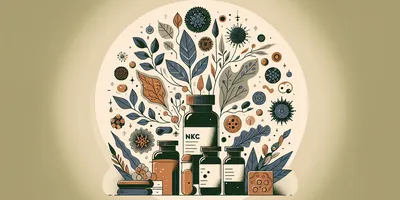
Enhances Natural Killer Cell Activity
Shiitake has been found to support the body's immune defense through the activation of natural killer cells (NKC), which play a crucial role in the early response to various infections and in recognizing and controlling early signs of cancer. The modification of Rice Bran Arabinoxylan Compound (RBAC) using enzymes from Shiitake mushrooms increases its immunomodulating potential. This has particular benefits for immune health, especially in aging populations whose immune systems are naturally diminishing.
Research has demonstrated that RBAC, influenced by Shiitake's enzymatic treatment, can enhance the phagocytic activity of crucial immune cells like macrophages and neutrophils, in addition to boosting natural killer cell activity. These enhanced NKC activities contribute to a more robust immune system capable of effectively combating infections and potentially reducing the risk of cancer development.
Moreover, RBAC has been shown to play a role in adaptive immunity, facilitating dendritic cell maturation which leads to bolstered T and B cell responses. This adaptogenic effect of Shiitake can result in an immune system that is more responsive and better equipped to deal with pathogens. In clinical settings, RBAC derived from Shiitake has been associated with improved quality of life in older adults by augmenting their immunity against common threats such as the influenza virus.
Aside from these immunological benefits, RBAC also exhibits antioxidant properties and may regulate mast cell responses, alleviating allergic reactions. Additionally, its ability to modulate VEGF-induced angiogenesis further underscores its potential in influencing immune cell functioning and inflammatory responses. Given these multifaceted effects, coupled with its safety profile that indicates no adverse impact on kidney and liver functions, Shiitake's value in immune health is apparent, although continued research is necessary to expand our understanding of its comprehensive benefits.
Learn about mushrooms with NKC activity benefits.

Supports Dendritic Cell Maturation
Shiitake mushrooms have shown promise in stimulating and improving the body's immune response. A notable aspect of this immune modulation is the maturation of dendritic cells. Dendritic cells are crucial in the adaptive immune system, having the unique ability to present antigens and activate T and B cells.
A polysaccharide compound derived from rice bran known as Rice Bran Arabinoxylan Compound (RBAC), which is treated with shiitake mushroom enzymes, has demonstrated remarkable immunomodulatory capabilities. This compound plays a pivotal role in the enhancement of dendritic cell maturation, which is essential for initializing the adaptive immune response efficiently, leading to an improved defense mechanism against infections.
The compound's influence extends beyond just dendritic cells; it also augments the phagocytic activity of macrophages and neutrophils, along with boosting natural killer cell activity. This multifaceted enhancement of the immune system suggests that shiitake mushrooms can be particularly beneficial for aging individuals with compromised immunity.
Moreover, clinical evidence supports the health benefits of RBAC, including a better quality of life for older adults by strengthening immunity against common infections, such as influenza. This suggests that shiitake mushrooms could play a substantial role in promoting immune health and potentially reducing the burden of age-related immune dysfunction.
Learn about mushrooms with dendritic cell maturation benefits.

Enhances T and B Cell Responses
Shiitake has been recognized for its capacity to support adaptive immunity. A crucial component derived from Shiitake, Rice Bran Arabinoxylan Compound (RBAC), significantly enhances immune health, particularly in older adults with compromised immune systems. RBAC is noted for its immunomodulating abilities, which include augmenting phagocytic activity in macrophages and neutrophils, as well as increasing natural killer cell activity—an essential facet of innate immunity.
Moreover, RBAC has been shown to activate adaptive immunity by promoting dendritic cell maturation, essential for initiating T and B cell responses. This action is critical for developing a finely tuned immune system capable of responding to various pathogens effectively.
The compound also exhibits potential in regulating mast cell responses, which could be beneficial for mitigating allergic reactions. Another aspect of RBAC's capabilities lies in its influence on angiogenesis via VEGF modulation, which may impact the broader immune system functions and inflammatory responses. Importantly, clinical studies have linked RBAC with enhanced quality of life for seniors by bolstering their defenses against common infections such as the flu.
Overall, RBAC's multi-faceted effects on both innate and adaptive immunity—particularly its role in T and B cell function—underline Shiitake's value as an immunoceutical in health and aging. Its safety profile, which indicates no cytotoxicity or adverse impacts on liver and kidney functions, makes it a promising candidate for further research to fully unravel its benefits for long-term health maintenance.
Learn about mushrooms with T and B cell response benefits.

Allergy Mitigation Benefits
Shiitake mushrooms have been recognized for their valuable health properties, including the ability to mitigate allergic reactions. This is largely attributed to a compound known as Rice Bran Arabinoxylan Compound (RBAC), which is processed from rice bran with the help of enzymes produced by Shiitake mycelia. This immunomodulating agent not only enhances the body's immune defenses but also plays a role in regulating allergic responses.
One highlight of RBAC's capabilities is the regulation of mast cell activity, which is crucial since mast cells are a key component in allergic reactions, including the release of histamines that cause symptoms. By modulating these responses, Shiitake mushrooms can help provide relief to those suffering from allergies.
Moreover, RBAC’s influence on immune cell activity extends to enhancement of phagocytic activity of immune cells like macrophages and neutrophils, crucial for the body's first line of defense. Additionally, the compound boosts natural killer cell activity, strengthening the body's innate immunity to respond more effectively to allergens.
Research on RBAC has, so far, pointed to promising outcomes for the elderly, particularly with regard to improving their resistance to common infections such as influenza. Importantly, clinical studies underscore RBAC's safety, showing no cytotoxic effects and no adverse impact on kidney and liver function, which reinforces the potential of RBAC derived from Shiitake mushrooms as a safe and effective allergy mitigator.
Despite these encouraging findings, ongoing research is necessary to delve deeper into RBAC's bioavailability, chemical structure, and long-term impact on health and aging. Nonetheless, the existing evidence provides a solid foundation for considering Shiitake mushrooms as a natural avenue for allergy relief and immune system support.
Learn about mushrooms with allergy mitigation benefits.

Regulation of Inflammation
Shiitake mushrooms have shown significant potential in the regulation of inflammation, offering a natural approach to managing inflammatory conditions. One of the notable components derived from this mushroom is the Modified Rice Bran Arabinoxylan Compound (RBAC), which exhibits immunomodulating capabilities.
RBAC, a nutraceutical obtained from rice bran treated with enzymes from Shiitake mushrooms, extends health benefits by enhancing the phagocytic activity of immune cells like macrophages and neutrophils, thereby strengthening the body's defense system. Additionally, it boosts the activity of natural killer cells, instrumental in combating infections. This immunomodulation also includes the activation of adaptive immunity through dendritic cell maturation which leads to an improved T and B cell response, essential for effective immune function.
The anti-inflammatory properties of RBAC are further highlighted by its ability to regulate mast cell responses, offering relief from allergic reactions. Furthermore, it plays a role in inhibiting VEGF-induced angiogenesis, which can influence immune cell functioning and subsequently inflammatory responses.
Interestingly, clinical studies underscore that RBAC can enhance the quality of life in older adults by bolstering immunity against common infections, such as influenza, without significant side effects on liver and kidney function. Research highlights the importance of further study into the bioavailability, chemical composition, and long-term impacts on health and aging to fully grasp the benefits of RBAC derived from Shiitake mushrooms.
Learn about mushrooms with inflammation regulation benefits.

Modulates Angiogenesis
One intriguing benefit of Shiitake mushroom is its capacity to influence angiogenesis, the process through which new blood vessels form from pre-existing vessels. Angiogenesis plays a critical role in various physiological and pathological processes, including wound healing, cancer progression, and cardiovascular diseases.
A critical component derived from rice bran treated with Shiitake mycelial enzymes known as Rice Bran Arabinoxylan Compound (RBAC) has been documented to have immunomodulating properties that may aid in regulating angiogenesis. By modulating vascular endothelial growth factor (VEGF)-induced angiogenesis, RBAC demonstrates potential in affecting immune cell functioning and inflammatory responses, which are intertwined with angiogenic processes.
The implications of this angiogenesis modulation are significant, considering that precise regulation of angiogenesis is crucial for maintaining health and preventing disease. For instance, the immunomodulatory effect of Shiitake could be harnessed in therapeutic strategies aimed at diseases characterized by abnormal angiogenesis, including various types of cancer and ocular disorders. The ability of Shiitake to potentially control and balance this intricate process underscores its value as a functional food in promoting health and managing age-related conditions.
Learn about mushrooms with angiogenesis modulation benefits.

Improved Quality of Life
Shiitake mushrooms offer significant benefits that contribute to an improved quality of life, especially as individuals age. The consumption of Shiitake-derived compounds, such as modified Rice Bran Arabinoxylan Compound (RBAC), has displayed promising results in enhancing immune function. RBAC, crafted from rice bran with enzymes obtained from Shiitake, showcases a range of health advantages, including antioxidant effects and the elevation of immune cell activities, such as those of macrophages and neutrophils.
Furthermore, RBAC supports the body's natural defense mechanisms by improving natural killer cell (NKC) activity, which plays a critical role in controlling infections. The immunomodulating influence of RBAC also extends to stimulating the maturation of dendritic cells, fostering robust T and B cell responses that are essential for adaptive immunity. This immunological support is particularly beneficial for aging populations who may experience a decline in immune proficiency.
In terms of moderating hypersensitivity, RBAC has been shown to regulate mast cell reactions, which can lessen allergic symptoms. Its modulation of VEGF-induced angiogenesis indicates a broader impact on immune cell functionality and inflammatory pathways. Clinical studies have concluded that regular intake of RBAC can significantly enhance the quality of life for older adults by strengthening their immunity against common infections, such as the flu.
Importantly, safety evaluations of RBAC reveal a favorable profile, with no evidence of cytotoxicity or harmful effects on kidney and liver functions, supporting its safe use as an immunoceutical supplement for health maintenance and aging. While further research is encouraged to elucidate its bioavailability, specific chemical makeup, and long-term health outcomes, current evidence positions Shiitake mushroom derivatives as a promising natural aid for a healthier and more resilient life.
Learn about mushrooms with improved quality of life benefits.

Reduces Inflammation
Shiitake mushrooms have been found to possess anti-inflammatory properties, essential for a healthy immune response. A notable study on this topic is the research into the effects of AHCC®, a standardized extract from Shiitake mycelia. In this study, Oral Supplementation with AHCC® Enhances Host Resistance against SARS-CoV-2 Infection, it was discovered that AHCC significantly reduced virus-induced inflammation, particularly in the lungs.
It was observed that after oral administration, AHCC not only decreased viral load but also mitigated the severity of inflammation caused by the virus. The reduction in inflammation is a key factor in the improved survival rate noted in the severe case model used in the study, the K18-hACE2 transgenic mice. These findings show the potential of Shiitake in managing inflammation, aiding the immune system in fighting off infections more effectively.
Beyond directly combating viral infections, the anti-inflammatory effects of Shiitake mushroom extracts like AHCC may hold broader implications for various conditions where inflammation plays a pivotal role. This reinforces the growing body of evidence supporting the inclusion of Shiitake mushrooms in diets for their health-promoting benefits.
Learn about mushrooms with reduced inflammation benefits.

Enhanced Survival Benefits
Shiitake mushrooms, particularly through their cultured mycelia extracts known as AHCC®, have shown promising results in enhancing host survival against viral infections. A significant study focusing on SARS-CoV-2, the virus responsible for COVID-19, demonstrated the potential of AHCC® to improve survival rates in infected hosts.
The research utilized two different mouse models to simulate severity of infection seen in humans: K18-hACE2 transgenic mice that develop severe symptoms, and BALB/c mice which experience milder symptoms. It was observed that oral supplementation with AHCC® led to a reduced viral load and inflammation in the lungs, substantially increasing survival in the severely affected K18-hACE2 mice.
In addition to reducing immediate threats from the virus, AHCC® demonstrated the capacity to enhance both innate and adaptive T cell immune responses. This bolstering of the immune system extended to the promotion of γδT cells in the spleen and lungs, as well as prompting Th1-prone mucosal and systemic T cell responses, creating an environment less favorable to viral proliferation.
Furthermore, the study revealed that in mice with mild symptoms, AHCC® supplementation was able to increase virus-specific IgG responses, highlighting its role in supporting the immune system's ability to remember and attack the pathogen effectively. This comprehensive immune support illustrates the benefits of Shiitake extracts not only for improved survival in severe infections but also for better disease outcomes in milder cases.
Learn about mushrooms with enhanced survival benefits.

Low Fat Content for a Healthier Diet
Shiitake mushrooms are recognized for their exceptional nutritional profile—rich in protein, brimming with vital vitamins, particularly B vitamins, and importantly, noted for their low fat and cholesterol levels. As health-conscious individuals increasingly seek nourishing low-fat food options, Shiitake offers a compelling choice that supports both well-being and savory appetites.
This attractive nutritional profile is discussed in the paper titled "Themes for mushroom exploitation in the 21st century: Sustainability, waste management, and conservation," which elaborates on the global mushroom market. The research delves into how Shiitake, along with other mushrooms, serves as a functional food that benefits consumer health while simultaneously addressing larger global challenges like food security and environmental sustainability. By efficiently converting agricultural wastes into valuable, low-fat edible biomass, Shiitake cultivation is paving the way toward a future where food production aligns with the goals of sustainability and responsible waste management.
The importance of incorporating Shiitake into our diets extends beyond their nutritional benefits, as they play a pivotal role in a more sustainable and environmentally-conscious food system. The study emphasizes the significance of cultivating Shiitake and other mushrooms in an eco-friendly manner, demonstrating their potential in waste conversion, soil fertilization, and even bioremediation. With their low fat content and numerous environmental benefits, Shiitake mushrooms are undoubtedly a superfood for the 21st century, fulfilling both health and ecological objectives.
Learn about mushrooms with low fat benefits.

Nutrient-Rich Profile
Shiitake mushrooms make a significant contribution to a healthy diet, packed with essential vitamins and minerals. They are particularly noted for their high vitamin B content, including B2 (riboflavin) and B3 (niacin), which are vital for energy production and the proper functioning of the nervous system.
The consumption of Shiitake can help in maintaining a balanced diet due to their combination of proteins, which are essential for body repair and growth, and minimal fat and cholesterol levels. Integrating Shiitake into meals can support overall nutritional health, making it an excellent addition to various dietary needs and lifestyles.
Aside from their immediate health benefits, Shiitake mushrooms also play a role in sustainable food production. Cultivating Shiitake emphasizes not only food security but also environmental sustainability and waste management. By efficiently converting agricultural wastes into nutritious biomass, Shiitake cultivation exemplifies an environmentally responsible approach to food production, aligned with global efforts to achieve a more sustainable and waste-conscious future.
Learn about mushrooms with vitamins benefits.
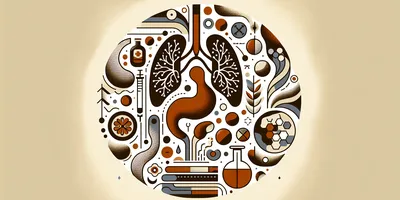
Supports Spleen Lymphocyte Proliferation
Shiitake mushrooms are well-documented for their positive effects on the immune system, particularly in spleen lymphocyte proliferation. Lymphocytes are a crucial component of the immune system, and their proliferation is an important indicator of immune health and the body's capability to respond to pathogens.
The Immunomodulatory Properties of Polysaccharides from Lentinula edodes research article explores how the polysaccharides present in Shiitake, especially β-glucans, are particularly effective in enhancing the immune response. These compounds interact with specific receptors on immune cells, triggering a cascade of beneficial immune responses. This leads to various positive outcomes, including the proliferation of spleen lymphocytes, which is key for a strong and robust immune system.
Among the notable benefits of Shiitake-derived polysaccharides is their ability to stimulate the activity of spleen lymphocytes. Lentinan, a well-studied β-glucan from Shiitake, has been singled out for its potent immunostimulatory effects. It has been known to not only enhance lymphocyte proliferation but also to balance cytokine production, thereby supporting both the innate and adaptive branches of the immune system.
It is important to note that factors such as the source of the polysaccharides, their extraction methods, and molecular structure can influence these immunomodulatory properties. Nonetheless, the research identifies Shiitake mushroom polysaccharides as promising natural agents that boost spleen lymphocyte proliferation and overall immune function.

Supports Enhanced Serum Interferon-γ Production
Shiitake mushrooms are not only a gourmet delight but also a powerhouse for supporting the immune system. One of the key benefits they offer is the capacity to upregulate serum interferon-gamma (IFN-γ) levels, a critical cytokine in orchestrating the body’s defense mechanisms against pathogens. IFN-γ plays a pivotal role in the immune response by activating macrophages and enhancing the functioning of natural killer (NK) cells and T lymphocytes.
A comprehensive review highlighted the impressive immunomodulatory properties of polysaccharides found in Shiitake, inclusive of the β-glucans that have proved to interact with immune cell receptors and prompt an array of immune activities. These include heightening phagocytosis, fostering cytokine production, and bolstering both innate and adaptive immunity.
The same review throws light on research reporting an escalation in lymphocyte proliferation and cytokine production in animal models. This research has stressed the importance of natural compounds derived from Shiitake in the regulation of immune responses, potentially translating into preventative and therapeutic advantages for various health conditions. An increase in serum IFN-γ level, as demonstrated in these studies, serves as an indication of an enhanced immune defense system - a benefit that could be vital for maintaining optimum health.
While the results are promising, it's important to note that the effectiveness of these polysaccharides can vary based on their source, the extraction process, and their structural integrity. The distinct β-glucan known as lentinan has been singled out as a particularly potent immunostimulant, whereas other forms may exhibit immunosuppressive actions. Moreover, the potential for Shiitake polysaccharides to serve as vaccine adjuvants to amplify immunogenicity presents an intriguing avenue for future scientific exploration.
Learn about mushrooms with serum IFN-γ level increase benefits.

Upregulated Cytokine Production
The immunomodulatory compounds found in shiitake, particularly the polysaccharides such as β-glucans, have a pronounced effect on the body's immune response. These natural compounds are capable of activating various components of the immune system, one of which is the upregulation of cytokine production. Cytokines are crucial for cell signaling in the immune system, and their enhanced production can lead to a more robust immune defense.
Shiitake polysaccharides work by binding to specific receptors on immune cells, which can trigger a series of immune responses. This includes the activation of phagocytosis, the proliferation of lymphocytes, and an increase in natural killer (NK) cell activity. Importantly, shiitake does not just stimulate immunity; it can also balance it by reducing proinflammatory cytokines, helping maintain an immune response that is effective yet not overreactive.
In human studies, extracts from shiitake have shown to modify cytokine profiles, enhancing the proliferation of peripheral blood mononuclear cells (PBMCs) and increasing the activity of NK cells. These effects are promising for disease prevention and treatment, pointing to the value of shiitake mushrooms in supporting the immune system. The paper titled Immunomodulatory Properties of Polysaccharides from Lentinula edodes highlights these findings and discusses the potential of shiitake polysaccharides as vaccine adjuvants to improve immunogenicity. For more detailed information, see the full research article here.

Enhances NK Cells Cytotoxicity
Shiitake mushrooms have been recognized for their potent role in immunomodulation, particularly through the activity of their polysaccharides such as β-glucans. These naturally occurring compounds have been shown to enhance the cytotoxicity of natural killer (NK) cells—essential players in the immune system tasked with the destruction of virus-infected cells and tumor cells.
According to research, these polysaccharides are capable of binding to receptors on immune cells, thus activating them and triggering a series of immune responses. This includes the heightened activity of NK cells, which plays a crucial role in the body's first line of defense against malignancies and viral infections.
The review highlights that animal studies have consistently shown an increase in NK cell activity upon administration of Shiitake-derived polysaccharides, and similar immunostimulatory effects have been observed in human studies as well. The influence of factors such as the source of the polysaccharides and extraction methods was also noted, pointing to the complexity of harnessing Shiitake's immunological benefits. Further understanding and standardization of these elements could enhance the application of Shiitake polysaccharides in not only promoting NK cell cytotoxicity but also in overall disease prevention and therapy.

Supports Phagocytic Function
Shiitake mushrooms are not only a gourmet delight but also a boon for your immune system. One of the key attributes of the mushroom is its ability to modulate phagocytic activity, a critical component in the body's defense mechanisms. Research underscores the immunomodulatory properties of polysaccharides found in Shiitake, particularly the β-glucans, which are known to interact with immune cell receptors and stimulate immune responses.
Such interactions result in various immunological enhancements, including heightened phagocytosis, where the body's phagocytes engulf and digest foreign particles and pathogens. The reviewed studies indicate that these polysaccharides may boost the proliferation of lymphocytes and the activity of natural killer cells, contributing to a more rapid and effective immune response. They also seem to have the ability to decrease the production of pro-inflammatory cytokines, which can otherwise lead to inflammatory conditions.
In human clinical settings, the consumption of Shiitake has been linked to improved proliferation of peripheral blood mononuclear cells (PBMCs) and heightened activity of natural killer (NK) cells. These changes in immune cell function reflect a more vigilant and responsive immune system, capable of swift and appropriate action against infections and possibly for disease prevention and treatment. As the fight against infectious diseases continues, the potential application of Shiitake's polysaccharides, such as Lentinan, is being explored not only as an immunostimulatory agent but also as a possible adjuvant in vaccines to enhance immunogenicity.
Learn about mushrooms with reduced phagocytic activity benefits.

Reduces Serum Levels of Proinflammatory Cytokines
Shiitake mushrooms have been celebrated for their potential in modulating the body's immune response. Specifically, the polysaccharides extracted from Shiitake have demonstrated a remarkable capacity to reduce serum levels of proinflammatory cytokines, shedding light on their therapeutic applications.
These immunomodulatory effects primarily stem from the action of the Shiitake-derived β-glucans, which can activate immune cells and lead to a spectrum of immune responses. Important among these is the downregulation of proinflammatory cytokines, which plays a critical role in ameliorating inflammation and reducing the risk of inflammatory diseases.
Research documented in studies on both animal models and humans reveals how Shiitake polysaccharides enhance lymphocyte proliferation and natural killer (NK) cell activity, while concurrently decreasing the production of cytokines that propagate inflammation. This effect is pivotal for individuals with chronic inflammation or autoimmune conditions, where controlling the inflammatory response is crucial for disease management and enhancing overall health.
As this research evolves, it also unfolds the complexities involved in the immunological impact of Shiitake, influenced by variables such as the extraction process and structural nuances of the polysaccharides. Nonetheless, the consistent observation has been the ability of these natural compounds to orchestrate a shift towards a balanced, less inflammatory state, offering a promising therapeutic avenue for harnessing the immune properties of Shiitake mushrooms.

Lowered Glucose Levels
One of the remarkable health benefits of Shiitake mushroom is its potential to aid in reducing blood glucose levels. A study titled "Effect of Lentinula edodes on Morphological and Biochemical Blood Parameters of Horses" examined the influence of Shiitake mushroom supplementation on various health parameters in horses. The results of this study were compelling, particularly in relation to glucose management. Horses that were supplemented with Shiitake showed lower glucose concentrations when compared to the control group.
This finding is of particular interest not just to those caring for horses, but potentially for humans as well. Lower glucose levels are important for managing hyperglycemia, a condition that is prevalent in diabetic patients. While more research is needed to fully understand the implications for human health, this preliminary evidence suggests that the Shiitake mushroom could be a valuable addition to a diet aimed at regulating blood sugar levels.
Learn about mushrooms with lowered glucose benefits.

Improves Quality of Life
The nutritional and medicinal benefits of Shiitake have been widely researched, leading to discoveries that extend beyond its traditional use. Notably, the Shiitake mushroom plays a key role in the production of Rice Bran Arabinoxylan Compound (RBAC), a substance known for its health-promoting qualities. RBAC is derived from rice bran, undergoing modification by enzymes from the Shiitake mushroom. This process enhances the biological activity of the compound, making it a powerful addition to the functional food and nutraceutical industries.
Studies have highlighted the impressive immunomodulatory and anti-inflammatory effects of RBAC, which include its antioxidant and anti-angiogenic properties. The application of RBAC has been primarily celebrated in the context of cancer therapy. It has shown potential in boosting immune functions, elevating the quality of life (QoL) for patients, and even extending their survival.
But the impact of RBAC goes beyond cancer treatment. Research indicates its efficacy in managing a variety of conditions—from HIV infection and diabetes to irritable bowel syndrome (IBS) and nonalcoholic fatty liver disease (NAFLD). Its contributions to combating chronic fatigue syndrome (CFS) and preventing the common cold are also of significant interest. With such an extensive range of applications and a record of safety at standard dosages, RBAC, made possible through Shiitake enzymes, stands out as a remarkable supplement for improving the overall quality of life.
Learn about mushrooms with improved QoL benefits.

Supports Dental Health
Dental health is paramount to overall well-being, with diet playing a crucial role in maintaining a healthy mouth. Shiitake mushroom has been found to offer significant anti-cariogenic benefits that may protect against the development of dental caries, a common oral health issue. A noteworthy study explored the effects of Shiitake mushroom fractions on dental plaque microcosms, providing insights into its potential as a natural caries-combating agent.
Research conducted using an in vitro caries model introduced a low molecular weight fraction of Shiitake mushroom extract, which, along with two subfractions designated SF4 and SF5, was examined for its influence on the cariogenicity of dental plaque. The results were illuminating, with the SF4 fraction in particular demonstrating a robust capacity to inhibit dentin demineralization while favoring healthier microbial populations in the plaque without negatively impacting bacterial mass.
The study highlighted a fascinating bioactivity of SF4—the ability to induce 'uncoupling' of glycolysis in the plaque microbiota. This refers to a situation where the energy production from the bacteria becomes less efficient, leading to an increase in acid production without the corresponding demineralization. Essentially, SF4 caused the plaque bacteria to waste energy, which hindered their harmful effects on the teeth.
While SF5 also displayed some level of anticariogenic activity, SF4 emerged as the standout candidate in Shiitake's arsenal against tooth decay. These findings underscore the valuable role that Shiitake mushroom could play in dental health regimens, potentially paving the way for innovative and natural strategies to combat caries. The complexities and mechanisms behind Shiitake's anticariogenic properties continue to capture the attention of scholars and medical professionals with the promise of developing novel oral health solutions.
Learn about mushrooms with anti-cariogenic benefits.

Cell Protection Benefits
Shiitake mushrooms possess remarkable cell protection capabilities, particularly due to the antioxidant activity of polysaccharides found in their mycelia. Research has indicated that these polysaccharides are effective in scavenging free radicals that cause oxidative stress, which is a key factor in the development and progression of various chronic diseases, including diabetes.
The study on Lentinus edodes mycelia polysaccharide (LMP) demonstrated its potent antioxidant activities, comparable to those of well-known antioxidants such as ascorbic acid. These antioxidant properties enable LMP to significantly reduce the levels of reactive oxygen species (ROS) within cells. This is critical in the protection of pancreatic beta cells, which are vulnerable to damage and apoptosis due to oxidative stress.
By maintaining the health and vitality of these cells, Shiitake mushrooms may provide a natural option for the prevention and treatment of diabetes-related complications. The ability to protect against cell apoptosis not only promotes longevity and health of pancreatic cells but also contributes to maintaining insulin production and blood sugar regulation.
Learn about mushrooms with cell protection benefits.